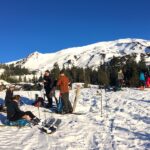Unprecedented crowds overwhelm Oregon trails, campsites.
Backpacking through Southwest Washington’s Indian Heaven Wilderness last Saturday, I came upon a woman begging for bug spray. I handed her a bottle of 100% Deet as another cloud of mosquitoes angled toward us.
“Thanks,” she said. “You know they call it mosquito heaven.”
That weekend I chose mosquitos over people.
I regret nothing. My girlfriend and I had a lake to ourselves, while down South in Oregon, people swarmed the landscape with the fervor of the blood-sucking parasites assailing our tent.
For many people, outdoor recreation used to mean seeking solitude in the wilderness. A German word, Waldeinsamkeit, expresses the feeling of being alone in the woods, a sensation at once disquieting and thrilling.
Oregonians used to feel Waldeinsamkeit when they recreated in the great outdoors.
But for Portlanders nowadays, hiking, like brunch, is a competitive sport.
Crowds choke the entrance to Oneonta Gorge. Lines snake beneath the bolted routes at Smith Rock. Along the Clackamas River, cars occupy every developed campsite. Hyper-vigilant family vacation strategists reserved them all seven months ago. Trash piles cloak once-pristine swimming holes like Three Pools.
Only a few destinations within a 60-minute drive remain largely undiscovered by the general public (No, I’m not revealing them here. Nice try).
The crowds are not only annoying, but dangerous. The more people stream into outdoor areas, the greater the chance they will chop down saplings for firewood, pitch trash into swimming holes or light fireworks at Punchbowl Falls.
These observations are nothing new. Every season, an Oregon media outlet runs a story on outdoor destinations being “loved to death.”
Crater Lake visitation ramped up 23% from 2015 to 2017, the Oregonian reported. The Salem Statesman Journal wrote that the state parks system broke its own record for visitation three years in a row since 2013. (Though interestingly, visitation dipped slightly in 2017, according to a Parks report.)
Related Story: Oregon hires Director of Outdoor Recreation
Let’s not forget that getting people outside is a good thing. All those hikers help sustain 172,000 outdoor industry jobs. They boost a $16.4 billion outdoor recreation economy through the sale of outdoor products. They cry foul at attempts to shrink our already overcrowded public lands—like President Trump’s swipe at Cascade-Siskiyou National Monument.
Outdoor activities develop leadership skills, preparedness and decision making (just ask the teen who started the Eagle Creek fire). Plus, if you break your ankle, plenty of people are on hand to save you.
Policymakers are thinking hard about how to balance the benefits with the deleterious effects of overuse. They’ve come up with a few new management strategies.
The Columbia Gorge Express shuttle bus expanded service this summer. Permits went into effect at Dog Mountain, the first such system I’ve heard of for a day hike in Oregon. The state created a groundbreaking Office of Outdoor Recreation.
Related Story: Congestion Pricing (after a fashion) comes to Dog Mountain
But one bus, one permit system and one office staffed by one guy are not enough. If visitors continue to flood into parks and wilderness areas, additional strategies will be necessary to protect fragile habitat.
In the not so distant future, Portland residents might have to buy a permit, park their car in Troutdale and hop on a National Park-style shuttle to day hike in the Gorge.
Managing trail traffic is not an easy puzzle, but it’s one we need to solve soon. It requires difficult conversations with planners, user groups, advocacy organizations and other stakeholders.
Actually, that’s the job description for Cailin O’Brien-Feeney, Oregon’s new Director of Outdoor Recreation.
While he and other policymakers piece it together, I’m going backpacking with the mosquitoes.
To subscribe to Oregon Business, click here.






